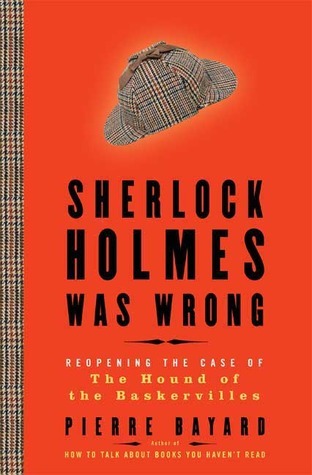Pierre Bayard

Le Titanic fera naufrage (Paradoxe) (French Edition)
Pierre Bayard
À l’image du romancier américain Morgan Robertson, qui raconta le naufrage du Titanic avec quatorze années d’avance, les créateurs semblent disposer d’un accès privilégié vers l’avenir, qui leur permet d’anticiper les guerres, les dictatures ou les catastrophes naturelles.
Prendre la mesure de cette capacité prémonitoire ne devrait pas seulement inciter à leur confier des responsabilités politiques et à les associer aux recherches de la science, mais aussi à remettre en cause notre lecture des œuvres ainsi que notre représentation de l’histoire littéraire et artistique.
Ce livre est le troisième volume d’une trilogie qui comprend également Demain est écrit et Le Plagiat par anticipation.

Sherlock Holmes Was Wrong: Reopening the Case of The Hound of the Baskervilles
Pierre Bayard
A playfully brilliant re-creation of one of the most-loved detective stories of all time; the companion book no Holmes fan should be without.
Eliminate the impossible, Holmes said, and whatever is left must be the solution. But as Pierre Bayard finds in this dazzling reinvestigation of The Hound of the Baskervilles , sometimes the master missed his mark. Using the last thoughts of the murder victim as his key, Bayard unravels the case, leading the reader to the astonishing conclusion that Holmes – and, in fact, Arthur Conan Doyle – got things all The killer is not at all who they said it was.
Part intellectual entertainment, part love letter to crime novels, and part crime novel in itself, Sherlock Holmes Was Wrong turns one of our most beloved stories delightfully on its head. Examining the many facets of the case and illuminating the bizarre interstices between Doyle's fiction and the real world, Bayard demonstrates a whole new way of reading a kind of "detective criticism" that allows readers to outsmart not only the criminals in the stories we love, but also the heroes ― and sometimes even the writers.

How to Talk About Books You Haven't Read
Pierre Bayard
If cultured people are expected to have read all the significant works of literature, and thousands more are published each year, what are we supposed to do in those inevitable social situations where we're forced to talk about books we haven't read?
In this delightfully witty, provocative book, a huge hit in France that has drawn attention from critics and readers around the world, literature professor and psychoanalyst Pierre Bayard argues that not having read a book need not be an impediment to having an interesting conversation about it. (In fact, he says, in certain situations reading the book is the worst thing you could do). Using examples from such writers as Graham Greene, Oscar Wilde, Montaigne, and Umberto Eco, he describes the varieties of "non-reading"—from books that you've never heard of to books that you've read and forgotten—and offers advice on how to turn a sticky social situation into an occasion for creative brilliance. Practical, funny, and thought-provoking, How to Talk About Books You Haven't Read is in the end a love letter to books, offering a whole new perspective on how we read and absorb them. It's a book for book lovers everywhere to enjoy, ponder, and argue about—and perhaps even read.
Pierre Bayard is a professor of French literature at the University of Paris VIII and a psychoanalyst. He is the author of Who Killed Roger Ackroyd? and of many other books.
Jeffrey Mehlman is a professor of French at Boston University and the author of a number of books, including Emigré New York. He has translated works by Derrida, Lacan, Blanchot, and other authors.

Who Killed Roger Ackroyd?: The Mystery Behind the Agatha Christie Mystery
Pierre Bayard
A French psychoanalyst and literary scholar offers a dramatic re-reading of Agatha Christie's classic novel, The Murder of Roger Ackroyd, challenging Hercule Poirot's conclusions about the identity of the killer and presenting a startling new solution to the crime.